苏教版初二下册英语
苏教版初二(下学期)牛津英语7B+Unit2+Speak+up+_PPT课件

1. 自然美2. 海边城市3. 世界之窗4. 参观主题公园5.全年6. 很有趣natural beauty seaside cities the Window of the Worldvisit a theme park all year roundgreat fun7. 在任何季节8. 爬山9. 在雨雪天气10. 去那的最佳季节11. 在一年中的那个时候in any seasonclimb the mountains or hillson cold and snowy daysthe best time to go thereat that time of yearTranslation1. 你可以一年四季去昆明旅行。
You can travel to Kunming all year round.2. Tom计划今年夏天去青岛玩帆船。
学科网zxxkTom plans to go sailing in Qingdao this summer.3. 我认为住在海边城市很有趣。
(great fun)I think it’s great fun to live near the seaside.4. 除了我,他们都去过北京了。
5. 在雨雪天气开车很危险。
It’s dangerous to drive on rainy and snowy days.6. 去苏州的最佳季节是春天或秋天。
The best time to Suzhou is in spring or autumn.7. 那里可能有雨,但一年中的那个时候天气不错. There may be some rain, but the weather is Usually nice at that time of year.8. 在中国有很多地方可去。
There are many places to go in China.根据句意、首字母或中文提示写出单词。
(完整版)苏教版初二下册英语单词表

19
international
国际的
20
gather
聚集,集合
21
huge
巨大的
22
darkness
黑暗
23
island
岛屿
24
several
几个,数个
25
lawn
草坪
26
relax
放松,休息
27
hard
辛苦的;艰难的
28
musical
音乐剧
29
bottom
底,底部
30
pick
挑选
31
组织
29
pale
苍白的
30
matter
事情,问题
31
check
检查
32
secretary
秘书
33
India
印度
34
officer
官员
Unit 8单词
序
英文
中文
1
dig
挖(洞,沟等)
2
serious
认真的,严肃的
3
breadfruit
面包果
4
reduce
减少,降低
5rLeabharlann cycle回收利用,循环利用
6
cause
33
publish
出版
34
so far
到目前为止
35
success
成功
36
translate
翻译
37
sales
销售量
38
copy
一本(份,册);副本
39
Canadian
加拿大(人)的
苏教版初二英语下册

苏教版初二英语下册单词chase[t∫eis]追求, 狩猎, 争取【记】cha(拼音:查)+se(拼音:色)→追查色狼→追逐。
【句】They caught the puppy after a long chase. 他们追了很久才把小狗逮住。
branch[brɑ:nt∫]分支, 树枝, 分店, 分部【记】发音想成“不让骑”(树枝细,不让骑)【句】The mouse is on the branch.老鼠在树枝上.somewhere['s?m(h)wε?]在(或到)某处【记】-some 表形容词,充满…的,具有…倾向的【句】He must be somewhere here.他一定在这里的某处.protect[pr?'tekt]保护, 投保【记】pro在前面+tect→在前面盖上→保护【句】These gallant soldiers will protect our country.这些勇敢的士兵会保卫我们的国家的。
extinct[iks'ti?kt]灭绝的, 熄灭的, 耗尽的【记】extinguish的同源词→灭绝的。
【句】A genus of extinct, large, flightless birds native to Madagascar.象鸟,隆鸟一种不会飞的巨鸟,产于马达加斯加岛,现已绝种scientist['sai?ntist]科学家【记】scientist这个词诞生于近代,时间约在1840年。
创造这个词的是英国剑桥大学历史学家费米尔。
他是根据拉丁词scien(了解)和法语词science (泛指一切学习的形式)而创造的。
但这并不意味着在这以前没有科学家,只是scientist一词出现得很晚罢了。
【句】I want to be a scientist.我想成为科学家.gorilla[ɡ?'ril?]大猩猩【记】源于希腊语Gorillai 多毛女人的部落看成go ill啦:总是和大猩猩在一起就会go ill gor污物-大猩猩很脏,身上还有病ill【句】The big one is a gorilla.大的是大猩猩.waddle['w?dl]蹒跚而行, 摇摇摆摆地走【记】“哇逗”→哇噻,真逗!这人儿走路跟鸭子似的,摇摇摆摆地走。
八年级下册英语(苏教版八年级)8BU4Reading语言点
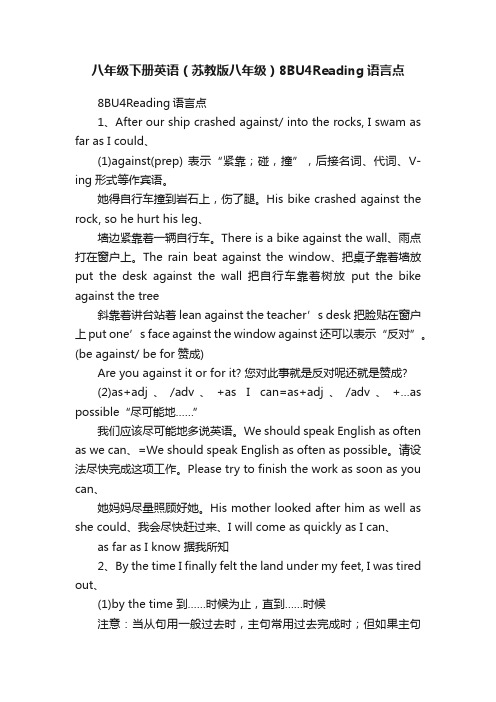
八年级下册英语(苏教版八年级)8BU4Reading语言点8BU4Reading语言点1、After our ship crashed against/ into the rocks, I swam as far as I could、(1)against(prep) 表示“紧靠;碰,撞”,后接名词、代词、V-ing形式等作宾语。
她得自行车撞到岩石上,伤了腿。
His bike crashed against the rock, so he hurt his leg、墙边紧靠着一辆自行车。
There is a bike against the wall、雨点打在窗户上。
The rain beat against the window、把桌子靠着墙放put the desk against the wall 把自行车靠着树放put the bike against the tree斜靠着讲台站着lean against the teacher’s desk把脸贴在窗户上put one’s face against the window against 还可以表示“反对”。
(be against/ be for赞成)Are you against it or for it? 您对此事就是反对呢还就是赞成?(2)as+adj、/adv、+as I can=as+adj、/adv、+…as possible“尽可能地……”我们应该尽可能地多说英语。
We should speak English as often as we can、=We should speak English as often as possible。
请设法尽快完成这项工作。
Please try to finish the work as soon as you can、她妈妈尽量照顾好她。
His mother looked after him as well as she could、我会尽快赶过来、I will come as quickly as I can、as far as I know 据我所知2、By the time I finally felt the land under my feet, I was tired out、(1)by the time 到……时候为止,直到……时候注意:当从句用一般过去时,主句常用过去完成时;但如果主句中得动词就是be时,则往往不用完成时。
八年级下册英语(苏教版八年级)8BU1 Grammar语言点

8BU1 Grammar语言点一.现在完成时的主要用法(一)表示动作开始于过去并持续到现在,常与since, for, recently, so far, since…ago, over/in/ during the past years等连用。
(二). 表示动作发生在过去,对现在造成影响或结果,常与already, yet, just, ever, never, before连用。
(三). 表示动作直到现在有多少次了. 常与once, twice, many times, how many times连用二.现在完成时的基本句型①陈述句肯定形式。
主语+ have/has+ 过去分词+其它I have had lunch. 已经吃过午饭了。
He has gone to Beijing. 他去北京了。
②陈述句否定形式。
主语+ have/has+ not+过去分词+…(在助动词have/has后+not,可缩写为haven’t/hasn’t)I haven’t had lunch. 我还没吃午饭He ha sn’t gone to Beijing. 他还没有去北京。
③一般疑问句形式及其答语。
Have/Has+主语+过去分词+…?(将助动词have/has提前,句末加问号)肯定回答:Yes , 主语+have/has. 否定回答:No , 主语+haven’t/hasn’t.-Has he gone to Beijing? 他去过北京了吗?-Yes, he has ./ No, he hasn’t.④特殊疑问句形式。
(疑问词+一般疑问句)特词+ have/has+主语+过去分词+…?Where has he gone? 他去了哪里?练习: 1.They have finished their homework. (改为一般疑问句,并做肯定回答)2.Mr. and Mrs. Li have come back.(改为否定句)3.John has played this computer game a few times.(改为否定句)4.We have seen that film. (改为一般疑问句,并做否定回答)5.Mr. Dong has repaired over ten bikes since last Monday. (改为否定句)三.过去分词的构成规则变化1、直接加–ed looked watched 2、以不发音的e结尾的,加–d changed moved3、以辅音字母加y结尾的,变y为i,加-ed studied carried4、重读闭音节,一元加一辅,双写辅音字母,加-ed planned dropped stopped不规则变化见课本第122-123页。
苏教版)初二英语单词表(下册)
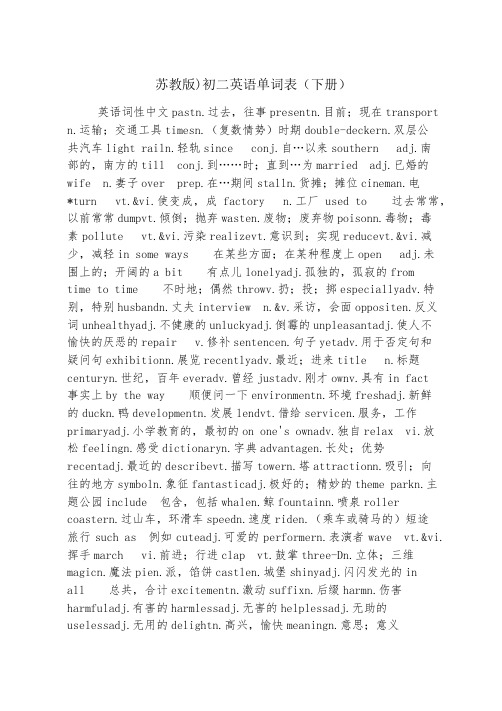
苏教版)初二英语单词表(下册)英语词性中文pastn.过去,往事presentn.目前;现在transport n.运输;交通工具timesn.(复数情势)时期double-deckern.双层公共汽车light railn.轻轨since conj.自…以来southern adj.南部的,南方的till conj.到……时;直到…为married adj.已婚的wife n.妻子over prep.在…期间stalln.货摊;摊位cineman.电*turn vt.&vi.使变成,成factory n.工厂used to 过去常常,以前常常dumpvt.倾倒;抛弃wasten.废物;废弃物poisonn.毒物;毒素pollute vt.&vi.污染realizevt.意识到;实现reducevt.&vi.减少,减轻in some ways 在某些方面;在某种程度上open adj.未围上的;开阔的a bit 有点儿lonelyadj.孤独的,孤寂的fromtime to time 不时地;偶然throwv.扔;投;掷especiallyadv.特别,特别husbandn.丈夫interview n.&v.采访,会面oppositen.反义词unhealthyadj.不健康的unluckyadj.倒霉的unpleasantadj.使人不愉快的厌恶的repair v.修补sentencen.句子yetadv.用于否定句和疑问句exhibitionn.展览recentlyadv.最近;进来title n.标题centuryn.世纪,百年everadv.曾经justadv.刚才ownv.具有in fact 事实上by the way 顺便问一下environmentn.环境freshadj.新鲜的duckn.鸭developmentn.发展lendvt.借给servicen.服务,工作primaryadj.小学教育的,最初的on one's ownadv.独自relax vi.放松feelingn.感受dictionaryn.字典advantagen.长处;优势recentadj.最近的describevt.描写towern.塔attractionn.吸引;向往的地方symboln.象征fantasticadj.极好的;精妙的theme parkn.主题公园include 包含,包括whalen.鲸fountainn.喷泉roller coastern.过山车,环滑车speedn.速度riden.(乘车或骑马的)短途旅行such as 例如cuteadj.可爱的performern.表演者wave vt.&vi.挥手march vi.前进;行进clap vt.鼓掌three-Dn.立体;三维magicn.魔法pien.派,馅饼castlen.城堡shinyadj.闪闪发光的inall 总共,合计excitementn.激动suffixn.后缀harmn.伤害harmfuladj.有害的harmlessadj.无害的helplessadj.无助的uselessadj.无用的delightn.高兴,愉快meaningn.意思;意义successn.成功delightfuladj.高兴的endlessadj.无尽的hopelessadj.无望的meaningfuladj.成心义的successfuladj.成功的linen.线条;排,行;列experience n.n.经历motorcyclen.摩托车lambn.羊羔conferencen.会议programmen.节目;(演出或活动)程序giftn.礼物marriagen.结婚,婚姻sail vi.驾驶(或乘坐)帆船航行abroadad.(在)国外;到国外check vt.核实,查明tie vt.捆,绑officern.官员detailn.细节dolphinn.海豚dessertn.甜点seafoodn.海鲜culturaladj.文化的state vt.陈说;说明clearlyadv.清楚地adjectiven.形容词adverbn.副词paragraphn.段落trunkn.象鼻rolen.角色turn on 打开remote controln.遥控器producern.制作人;制造商onlineadj.在线的;联网的televisionn.电视channeln.频道word processingn.文字处理programn.(电脑)程序newslettern.简讯educationaladj.教育的;教育性的CD-ROMabbr.只读光盘储备器come out (书等)发表,出版,发行designern.设计者travellern.旅行者itchyadj.痒的asleepadj.睡着的pointn.分数correctlyadv.正确地leveln.等级knowledgen.知识grammarn.语法vocabularyn.辞汇reachv.到达screenn.屏幕passvt.通过markvt.做标志purplen.紫色itchvi.痒keyboardn.键盘menun.菜单mousen.老鼠,鼠标typevt.打字iconn.图标clickvt.点击printv.打印widelyadv.广泛地e-dictionaryn.电子词典restartvt.重新启动settingn.设置;安装;(小说、戏剧fund-raisingn.筹募基金charityn.慈善;慈善机构microphonen.麦克风,话筒advertisevt.做广告;登广告leafletn.散页印刷品;传单catn.猫科动物hostvt.主持(电视或广播节目、cameran.照相机;(电视)摄像机popadj.流行音乐的on time 准时,按时jobn.工作,任务introducevt.介绍dutyn.责任;职责;义务eventn.事件;活动fann.迷;热情的爱好者seemv.好像,好像,看来businessn.企业;商行;工厂take part in 参加,加入organizationn.组织goodsn.商品,货物publicadj.公布的audiencen.观众;听众curtainn.幕;帷幕stagen.舞台voicen.嗓音actorn.演员,男演员performv.表演;实行;做hangv.悬挂;吊arrangementn.安排arrangev.安排speakern.扬声器;喇叭educationn.教育set up 建立,创建,设立amongprep.在…中phonev.给……打电话snowyadj.有雪的kidn.小孩silentadj.安静的donationn.捐赠breakn.休息speechn.演讲purposen.目的risevi.升起indeedadv.确切,真正地voluntaryadj.理想的,自愿的internationaladj.国际的pocketn.口袋pocket moneyn.零用钱be used to 习惯于furtheradv.更远,进一步health care 保健interviewern.采访者blindnessn.失明affectv.影响mostlyadv.主要地;大部分地casen.病例;案例curevt.治愈medicaladj.医学的;医疗的treatmentn.医治,对待volunteern.理想者;义务工作者operationn.手术patientn.病人affordvt.买得起;能做skilln.技能,技能trainv.培训,训练operatev.做手术proudadj.自豪的;自豪的medicine n.药;医学treat vt.对待;医治improvevt.改进;改进carry on 连续下去,连续发展rich adj.富有的,丰富的agreementn.同意,协议inventionn.发明物;创意educatev.教育punishv.惩罚uglyadj.丑陋的processn.进程warn.战争instead of 代替;而不是flow chartn.流程图researchn.研究;调查blindadj.瞎的;失明的deafadj.聋的disabledadj.有残疾的elderlyadj.上了年纪的,年老的homelessadj.无家可归的groupvt.分组;组成小组toughadj.困难的;费力的hiken.远足;徒步旅行trailn. (特定)路线,路径within prep.在…之内hilln.小山mountainn.高山;山岳excellentadj.极好的chancen.机会spiritn.精神;灵魂team spirit 团队精神;合作精神record v.记录of course 当然trainingn.训练;培训;锤炼fitnessn.健康take place 产生aimn.目的;目标aidn.帮助first-aid adj. 急救的airlinen.航线countrysiden. 乡村;农村gentlemann.君子,先生grandchildn.(外)孙子,(外)孙女handwritingn.书法;书写headachen.头痛overcoatn.外套pancaken.薄饼;烙饼postmann.邮递员toothbrushn.牙刷upstairs adv.在楼上weekdayn.工作日ache vi.疼痛look down on 轻视,瞧不起onlyadj.惟一的,仅有的flatadj.平整的,扁平的perfectadj.完善的,极好的attentionn.注意;专心rainyadj.有雨的umbrellan.伞wiseadj.明智的;充满聪明的mobilen.手机lostadj.迷路的;迷失的vetn.兽医vestn.背心,马甲versen.诗winen.酒;葡萄酒vinen.藤violinn.小提琴fundn.基金,资金certificaten.证书contactn.联系furtheradj.更多的,更进一步的downloadv.下载。
(word完整版)八年级下册英语(苏教版八年级)8BU1Reading语言点

(word完整版)八年级下册英语(苏教版八年级)8BU1Reading语言点8BU1 Reading语言点1.know …very well(=know a lot about…) 非常了解…我很了解这个地方。
I know the place very well. (提问)---How well do you know the place?I know a lot/ a little about the city. --- How much do you know about the city?2.since “自从…以来”,主句用现在完成时since five years ago= for five years(1)since(prep) +短语(过去的时间点)自从1980年以来,他就一直住在这儿。
He has lived here since 1980. (提问)---How long has he lived here?(2)since (conj)+ 句子(一般过去时)自从我们在学校碰面以来,我们就一直是朋友. We have been friends since we met at school.(提问)----How long have you been friends?(3)既然(conj)Since everybody is here, let’s begin our meeting.自从格林先生来到中国,他一直在这工作。
Mr Green has worked here since he came to China.从昨晚上,这小男孩就患了重感冒。
The boy has had a bad cold since last night .3.ever 曾经,常用于完成时,疑问句。
你曾听过这首歌吗?Have you ever heard the song?4.move house 搬家;搬进…move into…;搬出去… move out of sp.搬到另一个公寓move to another flat;搬离… move away5.in the northern part of town 住在城镇的北部= in the northof town住在中国北部live in the northern part of Chinasouthern eastern western6. married adj.“已婚的,结婚的”get married to sb. 与某人结婚(动作; be married to sb. 与某人结婚(状态)他们已经结婚十年了。
八年级下册英语(苏教版八年级)8BU6-Grammar-语言点教学内容
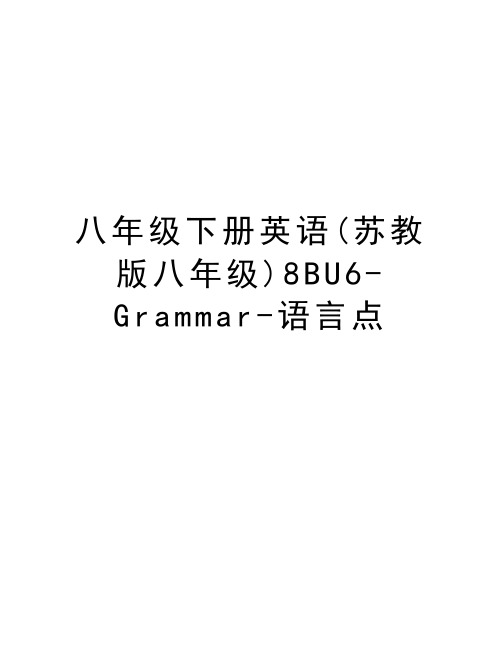
八年级下册英语(苏教版八年级)8B U6-G r a m m a r-语言点8BU6 Grammar 语言点语法要点:It is + adj + to-infinitive 做某事是…该句型中的形容词表示不定式所具备的特征或客观情况。
•It is +adj.+ for sb to do sth. 对某人来说,做某事是…•It is +adj. + of sb to do sth 某人做某事是(某人是….)该句型中的形容词描述的是人的特征、品质等。
It is +adj.+for sb+to do sth. 基本同‘It is +adj.+to do sth’,意思是:“对某人来说,做某事是......”=Doing/To do sth. is +adj.=It is +adj. +that-clauseIt is important for us to learn English well. =To learn /Learning English well is important for us.=It is important that we learn English well.常用的形容词有important,necessary,possible,difficult,easy,interesting,helpful...等,这里的形容词是对所做事情的好坏的性质的说明、修饰。
Difficulties: It’s +adj.+for sb.+to do sth./ It’s +adj.+of sb. +to do sth.相同点: for &of 后的人称代词都用宾格不同的:①...for sb.的句型通常使用表示客观情况的形容词;...of sb. 的句型一般主观感情、人物性格的形容词。
② ...for sb.则可转换成Doing/To do sth.is +adj; 而...of sb.句型可转换成Sb+be+adj+to do sth . It’s kind of you to help me with my English.=You are kind to help me with my English.用‘for’ or ‘of’填空:.1.It is really nice _____ you to help me work it out.2.You are under 18 years old, so it is impossibles _____ you to join the army.3.It is wise _____ you to take enough water.4.It is meaningful _____ everyone to join the Tree Planting Club.5.It is important _____ you to get there on time.6.It is kind _____ Millie to raise money for the poor.7.It is careless _____Simon to make the mistake.8.It is helpful _____ Andy to organize the charity show.语言点:1. donate ... to ... 捐……给…… donate money to charities给慈善机构捐钱donate blood to people in need 给有需要的人献血e.g. It’s kind of you to donate these clothes to Project Hope.你把这些衣服捐给希望工程真善良。
苏教版初二(下学期)牛津英语7BU4+comic_PPT课件
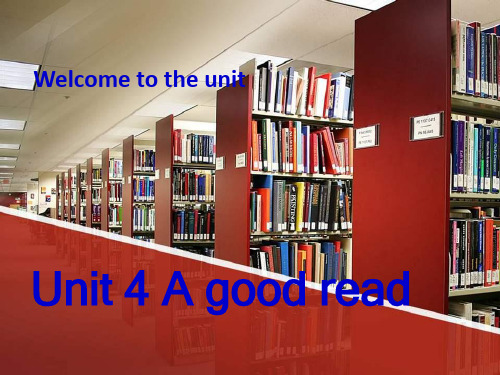
Welcome to the unitUnit 4 A good readLet’s learnsome new words.read n. 读物cooking n. 烹饪, 烹调n o vel n . 小说/n ɔvl/G er m a n y n . 德国German(s )/’dʒə:m ən i / 德国人kn ow l e dge u.n. 知识/nɔl i dʒ /French adj . 法国(人)的France n. 法国writer n. 作者, 作家ugly adj. 丑陋的/ʌgl i/ ugliness n.丑陋Words reviewreadcookingnovel Germany knowledgespareFrenchwriteruglytouch n. 读物n. 烹饪,烹调n. 小说n. 德国n. 知识adj. 空闲的;多余的adj. 法国(人)的n. 作者,作家adj. 丑陋的vt. 感动,触动Objectives➢To understand the comic strip➢To learn about the different types of books➢To talk about the type of book you likeListen and answerListen to the conversation between Eddie and Hobo and answer the following questions.Questions1. What did Eddie do after Hobo gave the books to him?2. What did Hobo think?3. Does Eddie really love reading?He used them to reach the box on the fridge.He thought that Eddie liked reading books.No, he does not.Fill in the blanks.Eddie asks Hobo ______ ____ ____ with the books. Hobo has not ________ ____.Eddie asks Hobo to give the books tohim. Eddie feels __________ because hedid not know that Eddie _____ books. In fact, Eddie wants to use the books to ______ the box on the fridge.what to dodecided yet surprised likedreachTalkLet’s watch this video clip. Do you like reading in your spare time? What type of book are you interested in?Sandy and Daniel are talking about what they like to read. Listen to their conversation and answer the questions. What is Daniel’s favourite type of book? Why?What is he reading now?He likes history books best. They improve his knowledge of the past.He is reading a book about Germany in World War II.What does Sandy like to read?She likes reading novels and plays. What book does she think is great? Why?The Hunchback of Notre Dame by the French writer Victor Hugo. The story of the ugly man Quasimodo really touched her.TalkWork in pairs and ask each other what you like to read and why you like it. Use Sandy and Daniel’s conversation as a model.Have you decided what to do with these books, Hobo?句中“疑问词what + 动词不定式”结构作宾语。
2022-2023最新版苏教版八年级英语下册教案(全)

2022-2023最新版苏教版八年级英语下册教案(全)Unit 1: Discovering New LandsLesson 1: Exploring the WorldObjectives:- Introduce the topic of exploring new lands and different cultures.- Develop students' listening and speaking skills.- Consolidate vocabulary related to travel and exploration.Procedure:1. Warm-up Activity (10 minutes)- Play a video or show pictures of famous explorers, such as Christopher Columbus or Zheng He.- Ask students questions about the explorers and their achievements.2. Vocabulary Introduction (15 minutes)- Introduce new words related to travel and exploration, such as "adventure," "navigate," and "discovery."- Provide examples and encourage students to use the words in sentences.3. Listening Activity (20 minutes)- Play an audio recording or present a dialogue about a travel adventure.4. Speaking Activity (15 minutes)- Divide students into pairs or small groups.- Give them a topic, such as "Describe your dream travel destination."- Encourage students to discuss the topic and share their ideas.5. Reading and Writing Activity (25 minutes)- Provide students with a short text about a famous explorer.- Ask them to read the text silently and underline important information.- Instruct students to write a paragraph summarizing the explorer's achievements.6. Wrap-up Discussion (10 minutes)- Lead a class discussion about the importance of exploration and travel in today's world.- Encourage students to share their thoughts and ask questions.Lesson 2: Cultural ExchangeObjectives:- Introduce the concept of cultural exchange and its benefits.- Develop students' listening and speaking skills.- Expand students' vocabulary related to cultural diversity.Procedure:1. Warm-up Discussion (10 minutes)- Ask students about their experiences with different cultures or cultural events.- Encourage them to share interesting stories or observations.2. Vocabulary Introduction (15 minutes)- Introduce new words related to cultural exchange, such as "customs," "traditions," and "diversity."- Provide examples and discuss the meanings of the words.3. Listening Activity (20 minutes)- Play an audio recording or present a dialogue about a cultural exchange program.4. Speaking Activity (15 minutes)- Divide students into pairs or small groups.- Give them a topic, such as "Describe a cultural event you would like to participate in."- Encourage students to discuss the topic and share their ideas.5. Reading and Writing Activity (25 minutes)- Provide students with a short text about a cultural exchange program.- Ask them to read the text silently and underline important information.- Instruct students to write a paragraph discussing the benefits of cultural exchange.6. Wrap-up Discussion (10 minutes)- Lead a class discussion about the importance of cultural exchange and understanding different cultures.- Encourage students to express their opinions and ask questions....(Continue writing the lesson plans for the remaining units and lessons in the document.)。
八下英语书苏教版ppt课件ppt

After school, go home, have dinner, and then rest
Part Two: A Busy Day
• Summary: Introduce the state of life during a busy day
Part Two: A Busy Day
My Favorite Subject: Science
Science is a very interesting and broad subject
It allows me to explore the world around me and understand how things work
Science can help me understand natural phenomena, so as why the sky is blue or why we have seasons
• Materials: The materials used in the course include visual aids, worksheets, and other relevant resources These materials are designed to enhance student learning and participation
Student Projects
Student projects are presented in the form of scenarios or role playing games These projects help students image their future selves in different situations and prepare them for potential challenges
八下英语书苏教版ppt课件ppt课件

目录
• Course Introduction • Teaching content • Teaching method • Current evaluation • Teaching resources
Group Discussion
Summary
Group discussions resource students to work together and share ideas
Description
The PPT courseware can include discussion prompts that resource students to collaborate in groups These discussions can focus on analyzing content, discussing topics, or developing critical thinking skills The courseware can also provide tools to facilitate effective group work, such as breakout rooms or online collaboration tools
04
CATALOGUE
Current evaluation
Classroom Performance
Class Participation
How engaged are students in class activities? Do they actively participate in discussions and are they responsive to teacher and peer input?
最新苏教版英语八年级下册知识点汇总
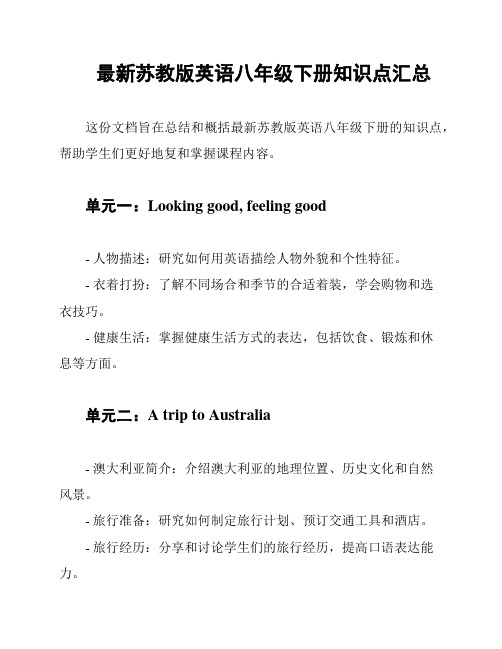
最新苏教版英语八年级下册知识点汇总这份文档旨在总结和概括最新苏教版英语八年级下册的知识点,帮助学生们更好地复和掌握课程内容。
单元一:Looking good, feeling good- 人物描述:研究如何用英语描绘人物外貌和个性特征。
- 衣着打扮:了解不同场合和季节的合适着装,学会购物和选衣技巧。
- 健康生活:掌握健康生活方式的表达,包括饮食、锻炼和休息等方面。
单元二:A trip to Australia- 澳大利亚简介:介绍澳大利亚的地理位置、历史文化和自然风景。
- 旅行准备:研究如何制定旅行计划、预订交通工具和酒店。
- 旅行经历:分享和讨论学生们的旅行经历,提高口语表达能力。
单元三:Fun with festivals- 节日起源:了解不同国家和文化的重要节日,包括春节、圣帕特里克节和除夕等。
- 节日庆祝:研究节日相关的词汇和表达,如传统食物、俗和庆祝活动。
- 节日体验:用英语描述和分享自己的节日庆祝经历,增长跨文化交流的能力。
单元四:Making a difference- 全球问题:讨论全球性问题,如环境保护、贫困和教育不平等等。
- 参与行动:了解并探讨如何积极参与解决这些问题,倡导绿色环保、无限循环和慈善捐赠等。
- 社会实践:分享和讨论学生们参与志愿服务或社区活动的经历和感受。
单元五:The future is now- 工作趋势:讨论未来可能出现的职业和工作趋势,如人工智能、生物技术和绿色能源等。
- 职业发展:研究如何制定职业规划和目标,提高职业技能和就业竞争力。
- 梦想与希望:用英语表达个人的梦想和希望,鼓励学生们积极追求自己的理想。
以上是最新苏教版英语八年级下册的知识点汇总概述,希望能够帮助你更好地了解课程内容和重点。
8下苏教版英语ppt课件ppt课件
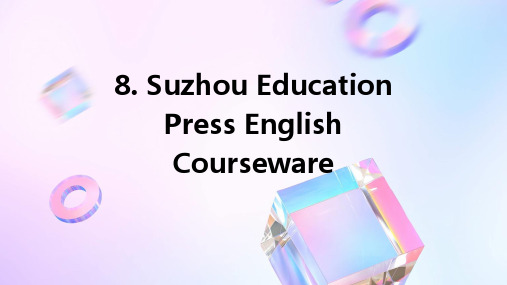
3
Listening
Understanding podcasts, news reports, and lectures.
Course outline
Speaking
Giving formal presentations and participating in debates.
Reading
Reading academic texts and critical theory.
Cultural Understanding
To introduce students to different cultures and help them understand and appreciate global perspectives.
Critical Thinking
To foster students' analytical and critical thinking skills by encouraging them to question, evaluate, and synthesize information.
Contextual understanding
Understanding the meaning of words and phrases based on the context of the sentence or paragraph.
Pragmatic understanding
Understanding the implied meaning of words and phrases based on the social and cultural background.
03
苏教版八年级下册英语知识点汇总

苏教版八年级下册英语知识点汇总一、词汇与短语1.高级词汇与短语:继续扩展词汇量,涵盖更复杂的主题,如社会议题、科技发展、环境保护、历史事件等,同时学习并熟练运用相关的短语和固定搭配。
2.同义词与反义词:学习并区分同义词和反义词,提高词汇使用的准确性和丰富性。
二、语法知识1.时态综合运用:o深入理解和熟练运用各种时态,包括过去完成时、现在完成进行时等,理解其在不同语境中的用法。
o复习并巩固之前学过的时态,如一般现在时、一般过去时、一般将来时等,确保学生能够灵活运用。
2.从句深化:o学习并掌握定语从句、宾语从句、表语从句等复杂从句的用法和构成,理解其在句子中的作用。
o复习状语从句,特别是条件状语从句、时间状语从句、原因状语从句等,提高从句的综合运用能力。
3.语态与语气:o复习并巩固被动语态的用法,学习并掌握不同时态下的被动语态形式。
o引入虚拟语气的概念,学习其在条件句、建议、愿望等语境中的用法。
4.非谓语动词高级用法:进一步学习非谓语动词(动名词、不定式、分词)的高级用法,如作主语、宾语、表语、定语、状语等。
三、听力与口语1.听力理解深化:通过更复杂的听力材料(如长对话、短文、讲座、演讲等),提高学生的听力理解能力,包括捕捉细节、理解主旨、推断隐含意义等。
2.口语表达流利性:加强口语训练,通过模拟真实场景、角色扮演、小组讨论等形式,提高学生的口语表达能力和流利性。
3.发音与语调:继续注重发音的准确性和语调的自然性,通过模仿、跟读、录音对比等方式,提高学生的语音语调水平。
四、阅读与写作1.阅读策略与技巧:教授学生使用各种阅读策略(如预测、略读、寻读、推断等)和技巧,提高阅读效率和深度。
2.阅读理解能力提升:通过阅读不同体裁和难度的文章(如新闻报道、科普文章、文学作品等),提高学生的阅读理解能力,包括理解主旨大意、细节信息、作者观点等。
3.写作技巧与结构:学习并掌握不同文体的写作技巧和结构(如议论文、说明文、叙事文等),通过写作练习,提高学生的写作能力。
八年级下册英语(苏教版八年级)8BU1Welcome语言点

八年级下册英语(苏教版八年级)8BU1Welcome语言点8BU1 Welcome语言点1 I’ve just eaten it. 我刚才把它吃光了。
just可用于完成时态中,置于动词与助动词之间,意为“刚刚”我刚刚做完家庭作业。
I’ve just finished my homework.我刚刚给我的笔友写了一封信。
I’ve just written a letter to my pen friend.just now刚才,相当于a moment ago,用于一般过去时,通常位于句首和句末。
刚才老师进教室了。
The teacher entered the classroom just now.2 You’ve changed, too. You used to be so kind to me.你也变了。
你过去对我那么好。
used to do sth 过去常常做某事(=often did sth in the past) 过去我们常在一起打牌,下象棋。
We used to play cards and Chinese chess together.我妈妈曾经是一位老师。
My mother used to be a teacher.这男孩过去常常放学后打篮球。
The boy used to play basketball after school.它的否定形式有两种:didn’t use to/used not toused to be 曾经是练习:I. 首字母填空1.My daughter studied very hard in the p .2.I’m afraid I can’t help you at p.3.Great changes have taken place in Taizhou s 1949.4.My father often go to work by u .5.At the fashion show, people wore clothes from different t .II. 用所给词的正确形式填空1.Tom has two (bowl) of rice for lunch.2.Linda didn’t want (listen)to the music again.3.We have meals three (time) a day.4.There (be)some old houses near the park in the past.5.It is dangerous (play ) with fire.III. 请从各题后所给的A, B, C, D四个选项中选出最佳答案。
八下英语书苏教版ppt课件

04
Unit 3
Vocabulary Building: Focus on effective vocabulary learning strategies
06
Unit 5
Writing Skills: Focus on writing different types of texts
02
Textbook analysis
Introduction
Introduction to the course objectives, materials, and teaching methods
01
Unit 2
Basic Grammar: Focus on presence structure and common
graphical errors
Ba Xia English Book Su Jiao Edition PPT courseware
目录 CONTENT
• Course Introduction • Textbook analysis • Teaching method • Teaching process design • Teaching Reflection
sentence types, verb tensions, and common graphical errors
03
Vocabulary building
Introduction to effective vocabulary learning strategies and
practice in expanding vocabulary.
Collaborative learning
To promote collaborative learning among students and develop their team work and communication skills
- 1、下载文档前请自行甄别文档内容的完整性,平台不提供额外的编辑、内容补充、找答案等附加服务。
- 2、"仅部分预览"的文档,不可在线预览部分如存在完整性等问题,可反馈申请退款(可完整预览的文档不适用该条件!)。
- 3、如文档侵犯您的权益,请联系客服反馈,我们会尽快为您处理(人工客服工作时间:9:00-18:30)。
一、听力(共三节,满分20分)第一节听句子, 选择最佳答语(共5小题; 每小题1分, 满分5分)每句播放两遍。
各句播放前每小题有4秒钟的阅题时间。
请根据各句内容及其相关小题,在4秒钟内从各题所给的A、B、C项中选出最佳答语,并在答题卡上将该项涂黑。
( ) 1. A. Thank you. B. What a good idea! C. I don’t like the beach(海滨).( ) 2. A. I like reading stories. B. I often read stories in the evening.C. Yes, but it’s too long.( ) 3. A. I like watching TV best. B. My favorite animal is the tiger.C. I often play with my cat at home.( ) 4. A. She’ll be happy. B. Let’s sing a so ng for our mother.C. Say goodbye to her.( ) 5. A. It’s at the cinema. B. Its name is Gone with the wind(《飘》). C. It’s on Sunday.第二节听力理解(共10小题; 每小题1分,满分10分)每段播放两遍。
各段播放前每小题有4秒钟的阅题时间。
请根据各段内容及其相关小题,在4秒钟内从各题所给的A、B、C项中选出最佳选项,并在答题卡上将该项涂黑。
听下面一段材料,回答6-7两个小题。
( ) 6. Where are the speakers?A. At a school.B. In a coffee shop.C. In a factory.( ) 7. How many books are there on Mr Chen’s desk?A. 2.B. 5.C. We don’t know.听下面一段材料,回答8-9两个小题。
( ) 8. How old is the man now?A. 18.B. 19.C. 89.( ) 9. When will Nancy get there?A. At 7:00 p.m.B. Before 6:30 p.m.C. At 6:30 p.m.听下面一段材料,回答10-12三个小题。
( ) 10. What does the man do?A. He introduces something to the visitors in the zoo.B. He is a keeper in the zoo.C. He is a guide in the zoo.( ) 11. How many kinds of animals are there in the dialogue?A. Three.B. Four.C. Five.( ) 12. How much meat does the tiger eat every week?A. About 8 kg.B. About 40 kg.C. About 56 kg.听下面一段材料,回答13-15题。
( ) 13. When do the students get up in the morning?A. 8:00 a.m.B. 8:20 a.m.C. 7:40 a.m.( ) 14. What is NOT true about the camp (露营)?A. Its students can have breakfast from 8:00 to 8:40.B. The first lesson starts at 9:00.C. Its students have a break at 10:00.( ) 15. What may the students do in the evening?A. Watch films.B. Hold some parties.C. Both A and B.二、第三节听取信息(共5小题;每小题1分,满分5分)听下面独白,请根据题目要求,从所听到的内容中获取必要的信息,并将答案填写在答题卡标号为16~20的相应位置上,听录音前,你将有10秒钟的阅读时间,录音播放两遍。
你将有40秒钟的作答时间。
Who writes this letter? (16) __________Where is James going to for Christmas? James is going to (17)_________ forChristmas.What are Linda’s parents going to do this year? They are goi ng to (18)_________the Disneyland in Japan.How are they going to Japan? They are going there by (19)_________How old will (将会) Linda this year? She will be (20)________ years old.语言知识及应用三、单项选择(共10小题. 每小题1分,满分10分)阅读下列各题,从各题所给的A、B、C项中选出最佳选项,并在答题卡上将该项涂黑。
( ) 21. —Where is the girl student?— _____is at school.A.She B.He C.Her( ) 22. There _____ a pear, two bananas and three apples on the table.A. amB. areC. is( ) 23. Please welcome Sean and Julie our school.A. toB. inC. on( ) 24. Mr and Mrs White ________ a new car.A. have gotB. has gotC. does( ) 25. She is Jane Black. You can call her ____.A. Miss JaneB. Miss BlackC. Black Miss( ) 26. Dad, _______ the TV please. I’d like to watch the TV play Here come the bears(熊出没).A. turn onB. turn offC. open( ) 27. -What would you like to eat, pork _________ beef?-I’d like pork.A. andB. orC. but( ) 28. There aren’t ________pictures on the wall.A. aB. someC. any( ) 29. Go online, maybe you get some for your travel to Guilin.A. homeworkB. informationC. food( ) 30.-Let’s go to Shunfeng Park on Saturday morning.-.A. That’s rightB. I don’t likeC. Good idea四、完形填空(共10小题; 每小题1分,满分10分)阅读下面短文,掌握其大意,然后从各题所给A、B、C项中,选出最佳选项,并在答题卡上将该项涂黑。
Hello, everyone! This is a photo of my ____31___. We’re from England. I am the taller (较高的) ____32___ in the picture. ____33___ wife (妻子) Sara is next to me. I have got____34___ children. Our children are ____35___ her. They are twins (双胞胎) and they are very small. Their ____36___ are John and Jim. They can’t swim ____37___ they can run. John is very clever. He can ____38___ the door for us. Jim can’t do this. John and Jim like ____39___, such as beef and pork. They don’t like vegetables and fruit. John’s____40___ food is sausage (香肠). Jim likes milk best.( ) 31. A. family B. hotel C. grandparents( ) 32. A. bird B. cat C. dog( ) 33. A. His B. My C. Your( ) 34. A. one B. two C. three( ) 35. A. in B. behind C. in front of( ) 36. A. sports B. colours C. names( ) 37. A. so B. but C. 不填( ) 38. A. open B. match C. play( ) 39. A. drinks B. meat C. vegetables( ) 40. A. favourite B. good C. nice五、阅读(共两节, 满分30分)第一节阅读理解(共10小题;每小题2分,满分20分)阅读下列短文,从各题所给的A、B、C和D项中,选出最佳选项,并在答题卡上将该项涂黑。
AAnn is my classmate. She comes from New York, and she lives in Shanghai with her parents now. Every morning, she goes to KFC to have breakfast. Sometimes she buys a hamburger for me. She can’t speak Chinese well. In the evening, her father often helps her with it. He’s a teacher in our school. He can speak Chinese very well.Ann thinks the school life (生活) in China is very interesting. Ann likes reading Chinese books because she wants to know more about China. She tries (努力) to talk with her Chinese friends in Chinese. She hopes to speak Chinese well. She is very happy to live in China. She loves people here.( ) 41. Ann is in ________ now.A. BeijingB. ShanghaiC. New YorkD. Hong Kong( ) 42.Sometimes Ann buys ________ for the writer (作者).A. chocolateB. a hamburgerC. an ice creamD. coffee( ) 43. What is Ann’s father’s job?A. A teacher.B. A driver.C. A manager.D. A doctor.( ) 44. How is Ann’s sch ool life?A. Boring (枯燥的).B. Busy.C. Bad.D. Interesting.( ) 45. What is Ann’s hope (希望)?A. To get fat.B. To have more friends.C. To speak Chinese well.D. To live in New York.BIn England, people don’t usually t alk much. When you go on a bus, or in a train, you will find everyone sits looking out of the window. They often read. They read books and papers (报纸), but they don’t talk too much.When you meet English people, they often talk about one thing-the weather. So when you meet somebody in England, you can say, “Nice weather for the time of year!”“But it was a little cold yesterday,” Somebody may answer. “But it got a bit warmer later,” you can say.Talk like this, and the English will think, “How friendly you are!”( ) 46. English people often _______________ on a bus.A. talk much about the weatherB. talk about books and papers they are readingC. eat or drink somethingD. read books or newspapers( ) 47. According to the passage(根据文章), when you meet English people, you can say “_____________”A. How do you do?B. How are you?C. Nice weather!D. Nice to meet you( ) 48. If you talk with the English people about the weather, they will think ______________.A. you are friendlyB. you are right.C. you are English .D. you talk too much( ) 49. Which of the following sentences is TRUE (正确的)?A. English people like to talk on the bus.B. English people don’t enjoy the best weather.C. English people are very friendly.D. English people often like to talk about the weather.( ) 50. English people always hope that _______________.A. The weather will get betterB. More people will talk about books and papersC. Someone will talk with them on a bus or in a trainD. All the people in the same bus or train are friendly(C)主题匹配(共5小题;每小题2分,满分10分)阅读下面5段语言材料,从A到F选项中,找出与它们相对应的标题,在答题卡上将其标号涂黑。
